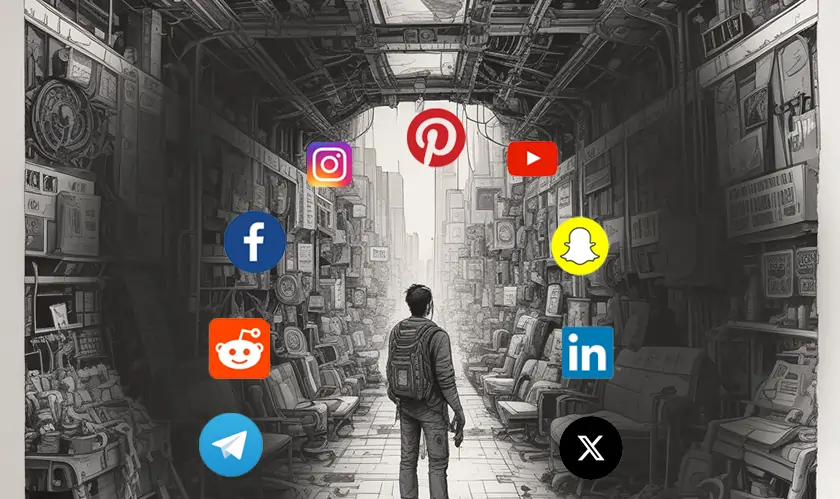Home Industry Digital marketing The Safest Content to Share on...
Digital Marketing

CIO Bulletin
05 September, 2024
Social networking is a common phenomenon of the contemporary world which allows people to communicate with each other, share informal experiences, as well as voice opinions. But as comes the advantage of social networking, there is a disadvantage of endangering your online privacy or your digital safety. It is also important to know what should not be posted on social media platforms in order to shield oneself from the risk of identity thefts, cyber criminality and other related perils.
This article looks at what is safer to post on social media and the ways to improve your online security.
The various social platforms give a unique opportunity to connect with a large population hence being effective means of expressing oneself. But this connectivity also presents the users to various dangers can be understood as a negative aspect. Social media has both positive and negative effects in the society its influences range from, identity theft to cyber bullying. Knowing these risks is the first towards protecting your online identity and thus keeping your social media experience safe.
Among the essential policies of preserving the personal privacy in the Information Age is not to disclose any personal identifiers. Some of the information that is ordinarily covered include; social security numbers, home address, phone numbers and financial information. By sharing any or all of these details, one becomes vulnerable to identity theft and other cyber related crimes. However, avoid giving out too many details and be careful as to which details you offer for someone to steal your accounts or wrong do.
2. Location Data: Why It’s Risky to Share in Real-Time
Location is one of the most popular and valuable resources, and there is something to be careful of. It is very alluring to geotag the photos and posts that you share and yet it is very dangerous when it comes to your privacy. This explains that in real time you give the potential criminals precise information of your location hence putting your life in real danger. Such a situation may result in some problems like theft cases or being approached by strange people. To protect yourself from sharing such sensitive information with anyone carelessly, you should possibly turn geography on the social network applications or share your geographic data only with the people you trust.
3. Life Events: What’s Safe to Share?
The fact is that sometimes, when we want to exchange important tasty news, for example, a vacation, a birthday or a celebration with the close family, we must learn to hide something. Sharing too much information has its own dangers, such as phishing scams or quite simple social engineering. Rather, one should share such information after the event has occurred or in a few people’s presence that is likely not going to leak it.
4. Financial Information: Why It Should Remain Confidential
It is therefore important that your financial information is well protected because they are sensitive in nature. Never disclose information concerning your bank accounts, your credit card numbers, or money transactions on the social sites. This is so because financial data contain information that may be useful to a criminal in perpetrating a fraud of other unlawful deeds. There is need to ensure safe social network use so as to ensure that personal financial information is not made public and shared through secure methods only.
5. Security Questions: What Not to Disclose
Security questions are usually employed or added on the account to enhance the security of an account. However, if you engage in a discussion on social networks about the answers to these questions, such an account can become vulnerable. Small talk is also prohibited because your answers should not include facts like your mother’s maiden name or name of your first pet or your first teacher. However, they should use good and special passwords, and also do not disclose responses to security question answers.
This is because most of the social networks available today have options for privacy concerns whereby you can set your preferences on who can view your posts and your profile. Use these settings to protect your privacy leveraging on them. Select your target audience for every post and periodically go through the available privacy levels to avoid exposing data you did not want to be exposed.
2. Be Careful of Third Party App
Almost all social networks allow third party applications which can take your personal data. One should be very careful when giving permissions to these apps and check the permissions that have been granted from time to time. Apps should only be downloaded from reliable sources only and users should limit the authorization given to apps that they no longer need.
3. Learn About the Best Practices on Social Media
Following the regular updates of its trends can help improve your safety while using social networks much. Read the cybersecurity tips and guidelines to be acquainted with the new threats and how to protect oneself against them. It is important to be aware of how one behaves online so as not to be at the receiving end of such menace while protecting one’s data.
4. Monitor Your Digital Footprint
Another important step is to keep track of one’s traces as often as possible, because this way you will know what info is already out there in the network. Perform a search of your name every now and then and check the results to be certain that nothing proprietary can be found. In this manner, you can know if you have any inviolate problems of individual justice which you can sort out before they form significant hassles in your way.
5. Think before You Post
Every time you go out to post something, you should first think about what may happen. Try to understand how the information can be utilized or abused and whether it is the kind of thing that one can will to share to the public. It may be useful to remember that when possible, people should try to share with some measure of thought, in order to minimize the chances of mishap and to generally retain a more active control over one’s presence on the internet.
It is important to point out that the question of safe usage of social networks is an urgent one. Thus, if you are able to learn more about the kinds of information that can be used to infringe on your privacy, you will be in a good position to avoid these attacks most of the time. The other measures include practicing safe sharing tips, managing privacy settings and precautionary measures on cyber threats.
According to these guidelines and being careful with what you share online, one can further improve their privacy on the social networks and avoid possible dangers. Basically, it is vital to realize that safe social media usage is definitely possible provided that one is a little extra cautious about the information that is being posted. Be up to date, act smarter and protect yourself when using the internet so that it can be safer and more secure.
FAQs
1. What types of personal information should I avoid sharing on social media?
Avoid sharing sensitive details like your home address, phone number, and financial information. This protects your privacy and minimizes risks like identity theft and cyber-attacks.
2. How can I protect my privacy while posting on social media?
Use strong privacy settings, avoid sharing location data, and think critically before posting personal information. Regularly review your security settings to ensure your profiles remain secure.
3. Are there specific social media best practices for safeguarding my online security?
Yes, use strong, unique passwords, enable two-factor authentication, and be cautious of suspicious links and messages. Regularly update your software to protect against vulnerabilities.
4. What are the risks of oversharing on social media?
Oversharing can lead to identity theft, cyber stalking, and data breaches. It also increases the risk of your personal information being misused by unauthorized parties.
5. How can I educate myself about social media safety?
Stay informed by following cybersecurity news, attending online safety workshops, and using resources from trusted organizations. Regularly review guidelines on social media best practices and privacy protection.







